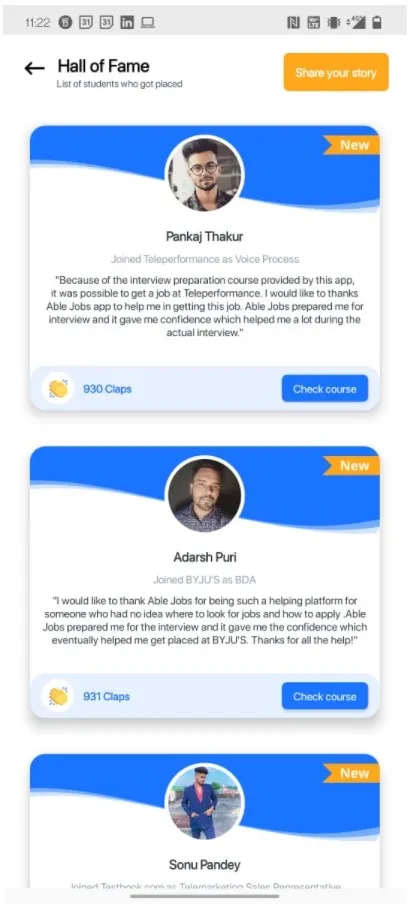[Product Roadmap] How Able Jobs built a skilling platform that helps over 1M people prepare for their first jobs
In this week’s Product Roadmap,we feature Able Jobs, a skilling startup that trains entry-level, non-tech graduate job-seekers for roles in sales and support.
Ravish Agarwal, Siddharth Srivastava, and Swatantra Kumar were looking at the jobs market when they thought of starting up. The trio realised that students needed help in finding the right jobs and being skill-ready.
“We observed the highly broken, non-tech skilling ecosystem. There was no one solving the job preparation problem for early non-technical graduates (though they are 6x more than engineering graduates),” Ravish says.
In 2019, this problem led them to start , an app to skill young graduates to get their first jobs. The app offers a comprehensive set of highly curated skilling programmes for top companies in areas like sales, customer service, etc.

Founders of Able Jobs
“We are pioneering a new vertical in edtech called skill-tech. The goal of skill-tech is to develop technology that creates skills in learners so they can accomplish vocational goals like getting a job or promotion. It comprises a set of products designed to help learners learn, do skill-based-tasks (real or simulated), and get reliable and quick feedback,” Ravish says.
Building for learners
The uniquely curated courses and AI feedback help learners prepare 10x better as compared to soldiering on the lonely journey of private job preparation. More than half a million users are coming on the app to feel confident about themselves by practising tough interview questions and job scenarios.
The initial days of Able Jobs involved curating an extremely unique curriculum and founders personally giving feedback to thousands of learners submitting their answers on the app.
“As time progressed, we were able to work on scalable learning pedagogy and building highly accurate AI models for automatic feedback. Over time, the exercises have evolved from simple MCQs and subjective questions to audio-based para comprehension and 100 percent automated subjective feedback now,” Ravish says.
The team started with a few jobs in sales, marketing, and operations, and started helping freshers prepare for interviews in a way that they actually gained real job skills.
“As our learners increasingly started to crack interviews and get dream jobs, we realised we had cracked the code. That is how we developed an extremely unique and effective pedagogy backed by state of the art AI-based exercises,” Ravish says.

The different phases
The first version was a simple swipe-card based micro-learning app with WhatsApp support. Ravish says the team was able to make this version in 10 days. The team launched in private beta, which helped them build carefully after taking feedback from early users.
The phases in the growth of Able Jobs products are :
First phase, or content library: The team made in-house content curated for specific dream jobs in non-tech segments. It was a simple card-based course based on the principles of micro-learning; a way of teaching and delivering content to learners in small, very specific bursts.
Second phase, or exercises: Real-life job experience based activities. People submitted subjective answers and recorded their voice answers. Trainers from the backend used to send feedback on the app.
Third phase, or practice tools with automated feedback: Using tons of data generated from the exercises and their evaluations, the team was able to create AI models for automated feedback of a variety of questions. “We have practice tools like selfie practice, audio real-time feedback, and HR Bot for subjective feedback,” Ravish says.
Fourth phase or, Indian English score-based job recommendation: Using the enormous voice recording samples of users, the team developed a simple IELTS-like score for judging Indian English skills. Using this score, the team developed an inventive recommendation algorithm to map candidates to jobs where the probability of selection is relatively higher.
“The first version lasted for a couple of months. It was a nail-biting period where we saw the users adopt and love the product. The app definitely had some major flaws but the core use case of effective skilling was being fulfilled. People only gave feedback about the exercises and feedback features. We knew from that day that we had to build an exceptional skilling product based on reliable and quick feedback to win users,” Ravish says.
The feedback that helped
A few factors that the team was cautious about, which in turn helped the team grow in the right direction include:
- A great online learning experience is paramount for non-tech graduates so Able Jobs was the first edtech destination for them.
- The entire experience needed to be delivered on the mobile phone as unlike tech graduates, their learners don’t have laptops.
- The learning experience should eventually solve for trust in a market that has been duped by colleges, local training institutions, and placement agencies.
According to the founders, some of the feedback that they received and helped :
- “Give me text first”: Video courses didn’t get as much love as text-based courses. Learners loved the card-based format as it resembled their college notes.
- “When is my interview?” “Our course completions started to grow exponentially as we included the interview date feature, which gave them a deadline to complete the course if they wanted to appear in the interview ,” Ravish says.
- “Give me more feedback”: He adds that the team was overwhelmed by the number of requests they received for including their AI-based feedback on subjective interview answers.
This feedback helped them evolve their product into:
- Hybrid content hosting service: For a great learning experience, the team built capabilities for hosting text and video in the same blended learning experience. Text enables active learning while video works well for reinforcement learning. Non-tech learners love a text-based approach to content because they are habituated to learning only from books for college exams.
- Mobile-friendly exercises: From recording voice examples to writing long subjective answers, everything happens on the app. The content, exercises, and feedback blend well in the mobile learning experience so learners don’t have to leave the app.
- Hall of fame: Learners work hard and get jobs on Able Jobs. A dedicated section of all real-time placements helps create trust in the app and provide inspiration to other users.
Deeper integrations and automation
After March 2020, things changed amid the COVID pandemic. People lost jobs and active learners on the Able Jobs app started increasing at an unprecedented rate.
“It was extremely hard for us to manually give feedback to each user’s submissions. We started building training data capabilities for AI models that would enable us to give automatic, accurate, and fast feedback without human intervention,” Ravish says.
Now, Able Jobs has made learners the focus of the product development cycle. The team believes in rapid prototyping, which happens because thousands of learners are active daily on the app, practising their job skills.
“As soon as we launch a learning feature, learners start using it and we have enough feedback for improvements within hours. Our users love our courses because it provides them with the confidence to crack any job. Our courses have short content snippets that can be shared among friends and this helps us bring a large number of users to the app. We have one million-plus registered users on the platform,” Ravish says.
Newer models
The team is divided into pods; some firefight existing problems while others work on rapidly scaling up infrastructure. The newer tools the team built include:
Selfie Practice tool: It is a common practice to recite speeches and answers in front of a mirror. While practice does give some confidence, it fails to help improve mistakes as people observe themselves in real time and not as a third person. The Selfie practice tool is an enhanced version of mirror practice, but on the app. A learner writes the answer themselves, practises with the front camera in karaoke style, and finally watches that video to catch mistakes and improve their presentation
HR Bot: A big bottleneck in non-tech skills is the subjectivity of responses to quiz questions like “Why are you interested in sales?”, “why should we hire you?”, etc. A job aspirant usually fails to get good feedback on answers, resulting in lack of these skills.
“Our AI model provides a unique practice-feedback experience that is a game changer. Once a student submits their answer for an interview question, they get an automated feedback on what they could have improved,” Ravish says.
Audio lessons: Interview nervousness is something that we have all faced. And, this problem is compounded if you are not comfortable with English. Imagine a friend that can help you improve all your spoken English mistakes until you get each answer right.
“Audio lessons are that loyal friend for our learners. It is a practice playground for learners to practise their pronunciation and feel confident about their verbal presentation,” he says.
Verbal English-based job recommendation: “At Able Jobs, we have developed an IELTS-like verbal English score for Indian English. It is decided by an AI model that processes the voice sample of the learner and calculates the score. Using this score and placement patterns in top companies, we have been able to recommend jobs that suit our learners’ verbal abilities.”
Future plans
The Able Jobs’ team is now building training chatbots. They already have automated feedback capabilities for a few common job skills, and the next step is to tie them in a conversational experience to simulate training on the app.
The team has also successfully developed a game-based practice playground with effective scores for each skill in a job role. They already see the learner’s obsession to improve their scores as it highly correlates with the probability of getting a job.
“We are planning to gamify our practice playground to motivate learners to improve scores quickly and crack interviews finally. We will launch a trainer app for trainers to analyse learners performance and send them targeted feedback. Having the ability to carefully observe the learning journey of hundreds of students at the same time is going to be the key capability to scale our operations,” Ravish says.
Edited by Teja Lele


![[Product Roadmap] How Able Jobs built a skilling platform that helps over 1M people prepare for their first jobs](https://images.yourstory.com/cs/2/a9efa9c02dd911e9adc52d913c55075e/PR-09-1632823467556.png?mode=crop&crop=faces&ar=2%3A1&format=auto&w=1920&q=75)
![[Techie Tuesday] Meet Dr Sudhir P Srivastava, the surgeon who builds robotic surgery products out of India](https://images.yourstory.com/cs/2/a9efa9c02dd911e9adc52d913c55075e/TT-03-1632730687401.png?fm=png&auto=format&h=100&w=100&crop=entropy&fit=crop)

![[Product Roadmap] Using tech, how Khatabook made incremental shifts in its product to touch 10 million users](https://images.yourstory.com/cs/2/a9efa9c02dd911e9adc52d913c55075e/Khatabookteam-01-1629810240935.png?fm=png&auto=format&h=100&w=100&crop=entropy&fit=crop)





